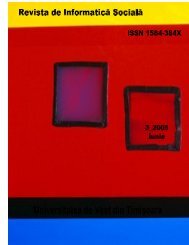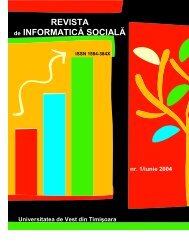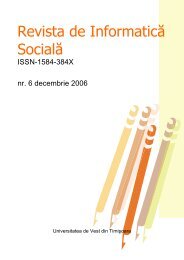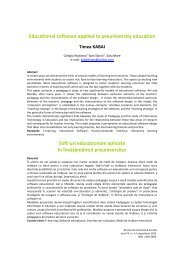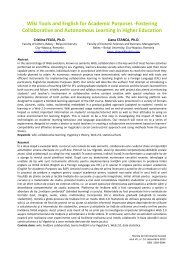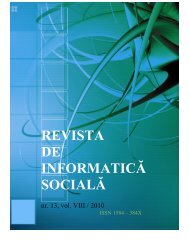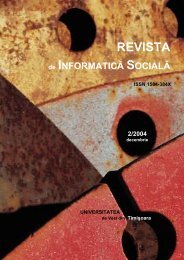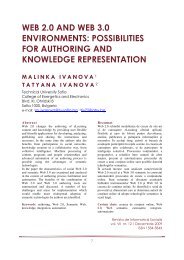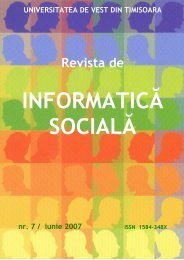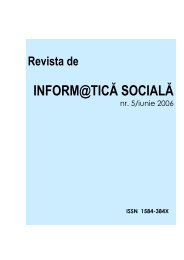the rigid sequence <strong>of</strong> steps that is usually presented, mainly in the textbooks, as the "scientificmethod".Tamir (1991) suggested different levels for an investigation when <strong>de</strong>veloped as a learning activityin science education (Table 1). Those levels actually represent the <strong>de</strong>grees <strong>of</strong> openness in aresearch. So, if in the first level the stu<strong>de</strong>nts must only draw conclusions, since everything else isfurnished, to the highest level they will make a series <strong>of</strong> <strong>de</strong>cisions, from formulating the problem tobe investigated until to reach the conclusions, passing through the choice <strong>of</strong> data that must becollected and their treatment. It is evi<strong>de</strong>nt that the less you give the stu<strong>de</strong>nt, higher will be the level<strong>of</strong> the research.Level <strong>of</strong> investigation Problem Procedure Conclusions0 Given Given Given1 Given Given Open2 Given Open Open3 Open Open OpenTable 1 – Levels <strong>of</strong> research in a Science Laboratory (Source: Tamir, 1991)The inquiry levels set by Tamir (1991), although directed to the practices in science laboratories,incorporate, in fact, the four levels <strong>of</strong> research in science set as established by Herron (1971),namely, [1] confirmation/verification, [2] structured inquiry, [3] gui<strong>de</strong>d inquiry and [4] openinquiry (Table 2). At level 0 (zero) stu<strong>de</strong>nts only confirm or verify the principles through activitiesin which the results are previously known. At level 1 (one), the structured inquiry, stu<strong>de</strong>nts do aresearch about a question asked by the teacher through prescribed procedures. At level 2 (two),gui<strong>de</strong>d inquiry, although doing a research on a question proposed by the teacher, stu<strong>de</strong>nts <strong>de</strong>fine theprocedures they will adopt, <strong>de</strong>signing the research. Finally, at level 3 (three), the open inquiry, thestu<strong>de</strong>nts must <strong>de</strong>fine a research path from the question to be investigated, which they own establish,until they reach the conclusions, making the choices that they consi<strong>de</strong>r the appropriate methodologyto reach the results.Level Type Problem Procedure Conclusion0 Confirmation/Verification 1 Structured Inquiry -2 Gui<strong>de</strong>d Inquiry - -3 Open inquiry - - -Table 2. Information provi<strong>de</strong>d to stu<strong>de</strong>nts in an investigative activity (Source: Herron, 1971)Project web-inquiry: autonomy and creativity in researchDespite criticism that points the contrary, the use <strong>of</strong> DICT may be a strategy to foster aninvestigative spirit marked by skills as creativity and autonomy. If there is criticism for theeducational projects that use the DICT, accusing them <strong>of</strong> inhibiting creativity and autonomybecause tie the stu<strong>de</strong>nts with procedures to be applied and thereby hin<strong>de</strong>r the freedom <strong>of</strong> choice and<strong>de</strong>mand - as is the case <strong>of</strong> the criticisms directed to the WQ - it does not end the issue. The constantquestioning also fertilizes changes because, after all, the use <strong>of</strong> DICT seems to us an irrevocablesituation at schools. As highlighted by Bla<strong>de</strong>s (2000), the use <strong>of</strong> DICT should be improved in or<strong>de</strong>rthey become instruments for the <strong>de</strong>velopment <strong>of</strong> skills that we aim for the stu<strong>de</strong>nts.
The Web-Inquiry Project [WIP] is a research project on the web that comes exactly to allow thestu<strong>de</strong>nts to <strong>de</strong>velop less structured inquiry. Without the “bonds” <strong>of</strong> WQ, the WIP should beun<strong>de</strong>rstood as a step up from the WQ, with greater emphasis on stu<strong>de</strong>nt critical thinking skills andless direction from the teacher. A breakthrough that, <strong>of</strong> course, does not eliminate the possibility <strong>of</strong>using WQ, but is justified, from an educational standpoint, because it enhances autonomy andcreativity in its execution. If un<strong>de</strong>r certain circumstances are justifiable fears <strong>of</strong> parents and teachersabout the risks <strong>of</strong> freedom <strong>of</strong> research on the Internet, a position in favor <strong>of</strong> a full education forcitizenship could show that these risks are not so significant. The full education, in contemporarytimes, is technological and human education, education for science and for a <strong>de</strong>mocratic life. Thesedimensions are not separated. From this perspective, we should be in favor <strong>of</strong> creativity andautonomy (Kenway, 1998; Rada, 2003). Although there is who suggests the use <strong>of</strong> WIP in K-12classrooms (Blanchard, Marshall, 2005), we consi<strong>de</strong>r WIP more appropriated for using with HighSchool stu<strong>de</strong>nts and at Higher Education. But we think it could be tested also in the final stages <strong>of</strong>Elementary Education. At this level we believe stu<strong>de</strong>nts can be stimulated to build situations forgreater autonomy in the process <strong>of</strong> constructing knowledge.The WIP basically supports a six-stage spiral path <strong>of</strong> inquiry (Molebash, Julius, 2004). The stu<strong>de</strong>ntstake a path that goes from the initial reflection (first stage) about a topic or subject to be researchedto the conclusions they draw from the data collected in the research (Figure 2). In each <strong>of</strong> thesestages, WIP - that like a WQ is organized in web pages available on a web server - has a specificrole (Figure 3).Figure 2 – Stages <strong>of</strong> the WIPIn the first stage, the teacher can resume some activity earlier or start a new one, in view <strong>of</strong>stimulating stu<strong>de</strong>nts' interest for a certain theme that integrates the planning <strong>of</strong> their discipline. Theteacher has to provi<strong>de</strong> a hook to promote stu<strong>de</strong>nts' interest and encourages them to reflect on thetheme. The WIP, in this part, can provi<strong>de</strong> i<strong>de</strong>as and resources for stu<strong>de</strong>nts to experience thepossibilities opened up from the hook set by the teacher and feel encouraged to go ahead,establishing strategies to approach the subject and doing searches with more freedom andautonomy.
- Page 1: Revista de Informatica Sociala 14 /
- Page 7: ● ● ●CONTENTS● ● ●[9-20
- Page 10 and 11: THE TRANSITION FROM OLD TO NEW MEDI
- Page 12 and 13: 30252023.420.325.11510500.85.5Never
- Page 14 and 15: Overall, we can therefore sum up on
- Page 16 and 17: n.a.I often use itI seldom use it6.
- Page 18 and 19: - Traditional web use: searching th
- Page 20 and 21: 19. Kvavik R.B., Caruso J.B. and Mo
- Page 22: IntroductionIn 1995, Bernie Dodge o
- Page 27 and 28: and even orally. The teacher will a
- Page 29 and 30: environment in which the teacher gu
- Page 31 and 32: Transformation Through Online Learn
- Page 33 and 34: INTRODUCTIONLeading practitioners a
- Page 35 and 36: learning. We also describe how the
- Page 37 and 38: Some of these transformations are b
- Page 39 and 40: Recently, Twigg has received suppor
- Page 41 and 42: Stage III: Unbundled Learning, Mark
- Page 43 and 44: perhaps using Second Life-like virt
- Page 45 and 46: performance. Indeed, Stage V will l
- Page 47 and 48: Free-Range Open LearningOver time,
- Page 49 and 50: New communities, tools and services
- Page 51 and 52: Embed enterprise-wide predictive an
- Page 53 and 54: In collaboration with Strategic Ini
- Page 55 and 56: Wiki Tools and English for Academic
- Page 57 and 58: eality. Besides being an additional
- Page 59 and 60: StudentPage 1StudentPage nTeacher
- Page 61 and 62: 100%90%80%70%60%50%40%30%20%10%0%Ac
- Page 63 and 64: 200Correlation View/Page Edits150Vi
- Page 65 and 66: 14. http://eacea.ec.europa.eu/llp/s
- Page 67 and 68: Simularea şi comunicarea electroni
- Page 69 and 70: RespondenţiRăspunsuriLa nivelul
- Page 71 and 72: RespondenţiRăspunsuriLa nivelul
- Page 73 and 74:
Respondenţii au fost rugaţi să i
- Page 75 and 76:
Itemul 9 doreşte să identifice ti
- Page 77 and 78:
Identificara opţiunii, chiar şi p
- Page 79 and 80:
EşantioaneRăspunsuri/Ranguriagita
- Page 81 and 82:
modalităţile practice prin care u
- Page 83 and 84:
1. INTRODUCEREÎn prezent, complexi
- Page 85 and 86:
Figura 1. Analiza grafică a evolu
- Page 87 and 88:
Faţă de această situaţie se deg
- Page 89 and 90:
variabilele acesti noi culturi cybe
- Page 91 and 92:
INTRODUCEREÎncă din anul 2000 am
- Page 93 and 94:
după tipul lecţiei: prezentare de
- Page 95 and 96:
Funcţiile oferite de AEL asigură
- Page 97 and 98:
• elevi/studenţi, beneficiari di
- Page 99 and 100:
Se poate folosi cadrul formal de co
- Page 102 and 103:
Evaluarea formativă este comentari
- Page 104 and 105:
Rezultatele elevilor, pe itemi:Diag
- Page 106 and 107:
Nr. Denumirea activităţii AEL MOO
- Page 108 and 109:
SEMNAL EDITORIALLaura MALITA, Vanna
- Page 110:
IN MEMORIAMConstantin TraianCHEVERE



